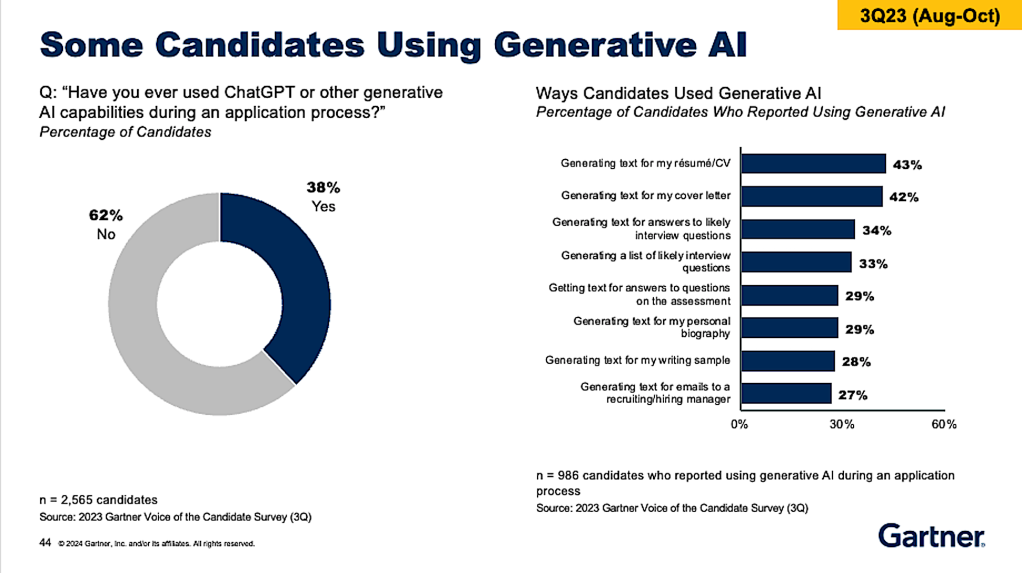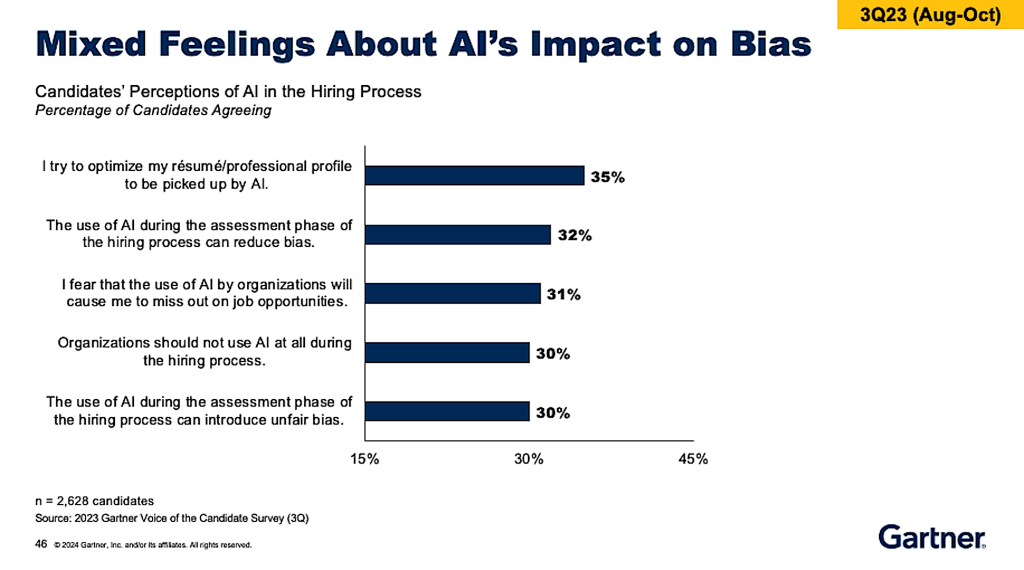Jobs
Job seekers and hiring managers depend on AI — at what cost to truth and fairness?

Employers and job seekers are increasingly turning to generative AI (genAI) to to automate their search tasks, whether it’s creating a shortlist of candidates for a position or writing a cover letter and resume. And data shows it can improve the chances at getting that job or finding the perfect talent match.
For human resources and hiring managers who are seeing an increase in responsibilities, genAI can create a short list of potential candidates in seconds — and automate much of the onboarding process.
For job seekers, genAI tools like ChatGPT can not only become creative companions in crafting narratives and emails to potential employers, but even assist applicants in passing assessment tests.
The darker side to using AI in hiring is that it can bypass potential candidates based on predetermined criteria that don’t necessarily take all of a candidate’s skills into account. And for job seekers, the technology can generate great-looking resumes, but often they’re not completely truthful when it comes to skill sets.
“The use of AI in talent acquisition is particularly prevalent in tech hubs and innovative industries where the demand for skilled professionals is high,” said Rick Hammell, founder and CEO of Helios, a workforce management platform startup. “The benefits and potential problems associated with using AI to find talent have global implications.”
Hammell and others see genAI offering improved recruitment outcomes, better candidate matching, and enhanced diversity and inclusion efforts. The challenges, however, include algorithmic bias, data privacy issues, and transparency.
“The need for transparent and ethical AI practices are concerns that organizations across different countries must address to ensure fair and unbiased hiring processes,” Hammell said.
GenAI aids job seekers with research, resumes, cover letters and more
A survey by Resume Builder updated earlier this month found that 18% of US workers used ChatGPT in their job search over the past year. The majority (75%) used it for research, but almost as many (73%) used it for resume creation. They also used the AI-powered bot for interview preparation (69%) and cover letter creation (62%), and more than half (51%) used it to create email communications.
The primary reasons job seekers used ChatGPT were to improve the quality of their application materials (88%), to appear more professional (76%), and to save time (65%).
Resume Builder’s survey of 1,000 US workers actively engaged in a job search within the past year also found that ChatGPT users are more likely to negotiate higher salaries and get more frequent interview requests than those who did not use the tool.
About one-third of respondents (29%) said they did not get hired because the employer became aware of their use of ChatGPT in the hiring process. However, 55% said they their prospective employer “praised” their use of the technology in the job search process.
“My guess is that some employers think ChatGPT promotes lying or cheating, while others see the efficiency and better application materials. It really shouldn’t matter if someone is using ChatGPT, as long as they use their experiences to create the information for applications. If they are using it to pass assessments, that isn’t right,” Julia Toothacre, Resume Builder’s resume and career strategist said in a report.
Not surprisingly, younger job seekers were more likely to use the chatbots, with 24% of 18- to 24-year-olds, 21% of 25- to-34-year-olds, and 25% of 35- to-44-year-olds saying they used the tool. Only 9% of 45- to 54-year-olds used ChatGPT in the hiring process. Men were also more likely to say they used ChatGPT than women (25% vs. 10%), according to Resume Builder’s report.
“The numbers related to age discrepancies in ChatGPT use aren’t surprising for a few reasons,” the report stated. “First, younger generations have historically been more likely to embrace new technologies. Second, there are a lot of people on social media right now sharing their ChatGPT hacks for job searching, so I think it’s something that younger generations are learning about more rapidly. They are likely frustrated with the hiring process and want to try anything they can to get ahead of the competition.”
Gartner’s 2023 survey of nearly 3,000 job candidates from 13 countries in 24 industries and spanning 21 job functions found an even higher percentage of job seekers using genAI tools in their search. Among the 38% of respondents to the Q3 2023 survey who used generative AI, 43% reported using it to generate text for their resumes, and 42% used it to craft their cover letters.

Gartner
The Gartner survey also found:
- Overall, those who used generative AI said it was responsible for a significant percentage of the final work.
- A third of candidates try to optimize their resume for AI technologies.
- Additionally, a third of candidates believe AI can introduce bias into the hiring process, while a similar number believe it can reduce bias.

Gartner
In some cases, employees also trust AI over their human managers to offer them career advice. Nearly half of Gen Z employees surveyed by an outplacement services firm Intoo indicated they’d trust a chatbot like ChatGPT for advice over their manager, who many said don’t support their career development.
GenAI automation helps overwhelmed hiring managers
On the hiring side, companies are adopting genAI to streamline their talent acquisition process. A recently published survey of 113 HR leaders by Gartner revealed HR technology as their top budget priority for the third consecutive year. Technology for “talent management” rose from seventh place last year to third this year.
A recent survey of 1,000 HR managers performed by payroll automation provider Sage showed that 95% of respondents have experienced a workload increase over the last year, and 91% noted an increase in their responsibilities. Seventy-seven percent of the respondents also believe that AI has the potential to revolutionize their work processes by reducing time-consuming tasks and ultimately easing burnout, according to the Sage survey.
More HR vendors and others are now offering AI-powered platforms to automate the creation of potential job candidate lists for hiring managers who are tasked with culling from lists of dozens, hundreds, or even thousands of job candidates.
HR technology company Phenom, for example, sells an AI-enabled hiring platform that creates a shortlist of job candidates for recruiters and hiring managers. Its technology, which the company claims is used by 200,000 hiring managers, creates a candidate list based on skills, experience, and location using “fit” scores, an assessment to evaluate a candidate’s suitability for a specific role and company.
“It streamlines interview scheduling for hiring teams, interviewers, and candidates through automation. It additionally enables hyper-personalized interactions with candidates, employees, and alumni through generative,” said John Harrington, senior director of product marketing at Phenom.
For job seekers, Phenom’s tool uses a semantic search engine that scans career websites to help candidates identify relevant job opportunities through context-driven algorithms, according to Harrington.
Startup Eightfold AI recently announced its AI-powered applicant tracking system (ATS) that handles the recruitment process for companies from end-to-end. The tool is also aimed at streamlining the recruitment process, enabling organizations to quickly identify and secure top talent through AI-powered recommendations. The Eightfold Talent Tracking tool also generates job descriptions, recommends job-posting platforms, and handles pre-onboarding integrations.
Iffi Wahla, CEO of startup Edge, a network that connects companies with remote talent around the world, believes AI bot tech — including OpenAI’s new ChatGPT-4o — will be used more often by companies to screen candidates. It will also increasingly be used by job seekers to write resumes, fill out applications, and prepare for interviews. And users of AI tech, he said, are likely to get more frequent interview requests than those who don’t use it.
Wahla believes that use of genAI by job seekers will leap from Resume Builder’s 18% figure last year to 50% of candidates this year. From 70% to 80% of Edge’s prospects who are registered with his talent network admit to using AI to help them craft resumes and other materials, Wahla said.
The Edge talent network’s AI-powered platform is currently serving the medical, dental, and insurance industries, helping them find talent to fill open positions while also automating onboarding processes. It can also handle remote workforce management for HR, functions like benefits administration, payroll management, and vacation oversight to ensuring legal compliance and handling taxes.
For companies, the time spent onboarding new employees after adoption Edge’s platform was reduced by 70%, Wahla said. The AI handles user questions, so there’s not as much back and forth with the recruiters or hiring managers, and it can also walk new employees through the steps of onboarding.
Job seekers, use genAI judiciously
What may be an issue is when chatbots craft resumes that aren’t particularly honest about the job seeker’s actual skills, embellishing on their talents because that’s what the AI was trained to do.
“Job seekers should definitely use AI to help them with the job search process, but it needs to be utilized with caution,” said Resume Builder’s Toothacre. The problem, she explained, is that AI is pulling its information from what is online, and not all advice and information is accurate.
Not all hiring managers and executives are enamored with the idea that AI is crafting a job applicant’s online persona and skill set.
“Any applicant using ChatGPT or other generative AI to pass assessments or write a cover letter would be a hard pass for me. I think it’s totally fine to use for interview practice or to generate ideas. But any time you are substituting the work of an AI for your own organic work, that’s where it crosses a line for me,” Andre Kazimierski, CEO of house painting business Improovy, told Resume Builder.
Job seekers need to make sure that whatever AI drafts for them, it makes sense for their experience and job function. “AI can sound too generic at times, so this is where putting your eyes on it is helpful,” Toothacre said.
She is also concerned about the use of AI to complete assessments. “Skills-based assessments are in place to ensure you are qualified and check your knowledge. Using AI to help you pass those assessments is lying about your experience and highly unethical.”
There’s plenty of evidence that genAI can improve resume quality, increase visibility in online job searches, and provide personalized feedback on cover letters and resumes. However, concerns about overreliance on AI tools, lack of human touch in resumes, and the risk of losing individuality and authenticity in applications are universal issues that candidates need to be mindful of regardless of their geographical location, according to Helios’ Hammell.
“Encouraging a balanced approach that combines AI assistance with personalization and creativity is essential for job seekers navigating the global job market,” Hammell said.







:max_bytes(150000):strip_icc()/roundup-writereditor-loved-deals-tout-f5de51f85de145b2b1eb99cdb7b6cb84.jpg)


